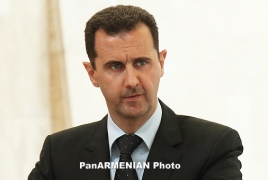Assad linked to Syrian chemical attacks for first time - Reuters January 14, 2017 - 16:02 AMT PanARMENIAN.Net - International investigators have said for the first time that they suspect President Bashar al-Assad and his brother are responsible for the use of chemical weapons in the Syrian conflict, according to a document seen by Reuters. A joint inquiry for the United Nations and global watchdog the Organisation for the Prohibition of Chemical Weapons (OPCW) had previously identified only military units and did not name any commanders or officials. Now a list has been produced of individuals whom the investigators have linked to a series of chlorine bomb attacks in 2014-15 - including Assad, his younger brother Maher and other high-ranking figures - indicating the decision to use toxic weapons came from the very top, according to a source familiar with the inquiry. The Assads could not be reached for comment but a Syrian government official said accusations that government forces had used chemical weapons had "no basis in truth". The government has repeatedly denied using such weapons during the civil war, which is almost six years old, saying all the attacks highlighted by the inquiry were the work of rebels or the Islamic State militant group. The list, which has been seen by Reuters but has not been made public, was based on a combination of evidence compiled by the U.N.-OPCW team in Syria and information from Western and regional intelligence agencies, according to the source, who declined to be identified due to the sensitivity of the issue. Reuters was unable to independently review the evidence or to verify it. The U.N.-OPCW inquiry - known as the Joint Investigative Mechanism (JIM) - is led by a panel of three independent experts, supported by a team of technical and administrative staff. It is mandated by the U.N. Security Council to identify individuals and organisations responsible for chemical attacks in Syria. Virginia Gamba, the head of the Joint Investigative Mechanism, denied any list of individual suspects had yet been compiled by the inquiry. "There are no ... identification of individuals being considered at this time," she told Reuters by email. The use of chemical weapons is banned under international law and could constitute a war crime. While the inquiry has no judicial powers, any naming of suspects could lead to their prosecution. Syria is not a member of the International Criminal Court (ICC), but alleged war crimes could be referred to the court by the Security Council - although splits among global powers over the war make this a distant prospect at present. "The ICC is concerned about any country where crimes are reported to be committed," a spokesman for the court said when asked for comment. "Unless Syria accepts the ICC jurisdiction, the only way that (the) ICC would have jurisdiction over the situation would be through a referral by the Security Council." The list seen by Reuters could form the basis for the inquiry team's investigations this year, according to the source. It is unclear whether the United Nations or OPCW will publish the list separately. Authorities said a total of 192 Azerbaijani troops were killed and 511 were wounded during Azerbaijan’s offensive. In 2023, the Azerbaijani government will increase the country’s defense budget by more than 1.1 billion manats ($650 million). The bill, published on Monday, is designed to "eliminate the shortcomings of an unreasonably broad interpretation of the key concept of "compatriot". The earthquake caused a temporary blackout, damaged many buildings and closed a number of rural roads. Partner news |